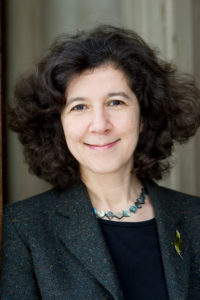Barbara Domayne-Hayman
BioLeader Interview – Barbara Domayne-Hayman, Entrepreneur-in-Residence at The Francis Crick Institute and Board Director (August 2021)

I am a company builder and deal-maker in biotech, who has successfully transitioned from working in large organisations to an entrepreneurial environment and mindset. I want to make a real contribution to society through the commercialisation of new science. I also have a passion for opera and playing the harp and piano.
Key milestones in your career journey to date?
- I received amazing support from my parents to pursue whatever career route I chose – which was initially a difficult decision between chemistry or music; fortunately chemistry won out with music remaining an all-encompassing passion and hobby.
- Well trained by ICI/Zeneca Agrochemicals; where I spent 11 years learning about international business.
- I decided to leave what was a good career track there and try something different – after a short spell in consulting, I did the Sloan Fellowship programme at London Business School which opened my eyes to the world of entrepreneurship.
- This was the channel for me to combine my science background and commercial skills while doing something entrepreneurial and led to my last 20 amazing years in executive leadership roles, learning how to do deals in biotech (starting with Celltech in 2001) and to build emerging biotech companies.
- I made the transition to a ‘plural’ career in 2013, since when I have sat on the Boards of several outstanding academic and industry organisations, supporting their innovation and growth – while still maintaining an operational role – I am Chief Business Officer at Autifony Therapeutics.
- In 2018, I started my role as Entrepreneur-in-Residence at The Francis Crick Institute and got involved in the emerging data driven health sector. I helped set up an accelerator programme called KQ Labs, which I now lead. This interface area where data meets biomedical science is exploding and has accelerated further since Covid-19.
Who has had the greatest influence over your career?
- My parents and a couple of great bosses at ICI, then Ian Nicholson at Celltech, who taught me about doing deals in biotech and Ken Powell at Arrow Therapeutics who instilled into me the importance of mentoring the next generation. But overall, I have carved out my own rather non-linear path.
- The insight I gained from ICI/Zeneca about how large corporations function has proven invaluable when sitting on the other side of the desk.
- Now actively involved in mentoring the next generation of scientists and leaders, I continually learn and am amazed and energised by this cohort of young talent.
Your approach to spotting and developing top talent?
- Recognising early on that the team is as important as the technology, great start-up opportunities need to find the right people to support their development.
- Understanding the strengths and gaps in founder profiles to ensure they receive the mentoring required to create success; and signposting to the relevant network and making those key introductions for them to the right people at the right time.
- Encouraging diversity creates balanced teams; 50% of the CEOs in the last two cohorts at the KQ Labs accelerator have been female.
What attributes make an outstanding leader in today’s world?
- The ability to communicate with clarity, passion and empathy.
- Creating multiple options for different outcomes which factor in uncertainty and ambiguity.
- Huge determination and resilience which you learn early on in biotech.
How do you create a culture of continual learning, innovation and curiosity; and how might volunteering contribute towards this?
- All the speakers and mentors involved with KQ Labs accelerator, now starting its 4th cohort, are volunteers who are so generous with their time and from whom we all continue to learn and innovate.
- Create a safe environment to allow early-stage companies to learn from these expert volunteers and from each other.
- Raise the profile of entrepreneurship as a career path for early career researchers – for example through the Summer Events programme we ran jointly between the Francis Crick Institute, The Alan Turing Institute, The Wellcome Sanger, and Entrepreneur First, specifically to inspire PhDs and Postdocs in biomedical and data science from across the UK to consider entrepreneurship as a way of enabling their science to have an impact.
The 2020 pandemic has changed the way we all work, possibly forever; what will remain beyond Covid and what will you welcome back?
- In my CBO role, Autifony has always run with a highly virtual team, located around Europe; so we were well prepared for the new video conferencing culture.
- KQ Labs, The Crick and the PULSE programme have successfully transitioned to virtual events which has encouraged greater delegate participation and broadened our geographical outreach; this will continue, given the certainty it creates to enable people to plan, and we will organise in-person networking events around this core.
Thoughts on the current funding model for early-stage companies; and the impact on valuations and availability of capital catalysed by the 2020 pandemic?
- Covid has highlighted the sector to investors and created more investment opportunities.
- That said, funding streams are polarised, with some seasoned entrepreneurs attracting large amounts of funding. In particular, the US continues to offer much greater funding potential.
- The average early-stage company continues to fight hard for funding at all levels, particularly in Europe.
- The interface between data science and biomedical science, where KQ Labs is active, doesn’t fit neatly into an investor box. The investors interested in this space tend to come from either biotech or tech: all are interested but tend to be wary of early stage investing and wait for the companies to get traction. Biotech investors don’t feel comfortable with the still-evolving business models, and tech investors are uncomfortable with the regulatory aspects of human health. This area represents huge opportunities, so we need to get the start-ups to be investment ready and encourage the investors to start investing earlier!
- The 10-year classic VC model is challenging when it comes to therapeutics investment, given the length of drug discovery and development processes, especially if dealing with highly novel targets in challenging areas. This can force earlier than ideal exits, which is one of the reasons the UK has struggled to build larger companies – although this is a complex subject with many contributing factors!
Regulators have adjusted their pace to meet the challenges of Covid; how can you foresee this might play out with the approval of future non-Covid therapies and technologies?
- Regulators and companies responded well to the challenge of Covid, collaborating to create the vaccines in record time – an astounding achievement.
- Parallel tracking worked but is high risk and takes huge resources. It would be good to select a few challenging disease areas, like neuroscience, and try to use the same model and drive that sense of urgency.
What will be the biggest technological transformation in the industry over the next 5 years?
- The impact of data on healthcare, particularly around precision medicine, will create better outcomes for patients at lower cost to the healthcare system – that is why we need to nurture our early-stage data driven health companies in the UK.
What is your hidden talent or something that might surprise others about you?
- I relish being able to immerse myself in music; playing the harp and piano and listening to classical opera; the challenge is making enough time for them!
Your simple philosophy on life?
- What goes around comes around; so always treat people with respect.
Words of wisdom?
- Best Advice I was given: In most organisations, ‘responsibility is lying around on the floor’ and if you want to pick it up and run with it, no one is likely to stop you.
- Advice I’d give: It is never too late to try something new or change direction, if you are determined enough to make it happen.
- What I wish I’d known: I tend to look forwards not backwards, whilst learning from past experiences – but I do wish that I’d discovered entrepreneurship earlier. There are so many amazing programmes on entrepreneurship available now for PhDs and postdocs which represent fantastic opportunities.
Click here to read more of our BioLeaders interviews.

